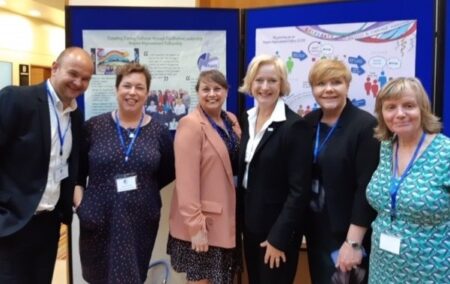Home News & Views Such short windows – Reflections on presence
Such short windows – Reflections on presence
Barbara O’Donnell

l-r Ryan Rukas, Barbara O’Donnell, Elly Brown, Ruth May, Anna Collins and Nicki White
‘Ichi-go ichi-e’ – the Japanese concept of the unrepeatable nature of each moment, every moment only occurs once.
The majority of my interactions, in both my NHS and writing lives, have been leading me towards the idea of ‘presence’ vs ‘being present’. Every moment of our lives, we are negotiating with presences and absences. It is quite possible to be present in your daily interactions, especially at work, but so focused on another task, or pulled by competing priorities; that it impacts on your ability to be present in the interaction you are having with real human beings.
One of the great privileges of being an Inspire Improvement Fellow, is the opportunity to explore and work with a variety of new methods and approaches. The workshops with the other fellows create a window into other people’s worlds and ways of working. I’ve also had the great pleasure of meeting Professor Michael West when he came to talk about compassionate and inclusive leadership. He has a very similar value set and principles to the Inspire Improvement Fellowship. Being in a room with Professor West is a lesson in presence. Once Professor West learns your name, he does not forget it during the session. He is generous with his time and keen to be engaged with his audience. The sense of feeling valued that one takes away from that cannot be overestimated.
Through my reflections as a fellow so far, I believe a key skill as a leader is to be as present as I possibly can, during every interaction that I have, with any other human being. I am trying to do this, using both active and deep listening, ensuring that I stay as engaged as possible, throughout a conversation, regardless of interruptions. I am also trying to be less conscious of time when an interaction comes up unexpectedly and allow the interaction to come to its own conclusion naturally. Additionally, I am also moving towards ways of guiding people to find their own solutions.
Through feedback from my team, this is the one thing they have requested from me. Throughout all the frantic activity that each day brings, ensuring that we deliver safe, kind care to our patients and fulfil the other myriad obligations that the role brings, what staff really want to know is that you are with them. In the busy world of operating theatre work, every human interaction is a short window. Surgical, anaesthetic or resuscitation situations all demand immediate and ongoing attention. Putting briefly aside whatever I am doing in that moment, can be challenging and isn’t always practical. However, as I persevere, the golden moment that results is that the staff member leaves the interaction, happy that they have been heard and have permission to fix things themselves, often needing no further action.
A further unexpected joy is that being present doesn’t just extend to being present for others. You can also be present for yourself. Quieter moments allow space to examine your own approaches, often bringing insight; usually when you are engaged in being present with a more routine task.
So I would encourage everyone to maximise these short windows, to take a breath, be present for yourself and be as present as possible for your team.
Comments are closed.

